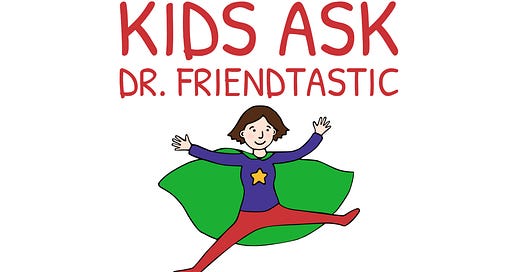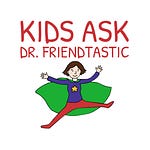The people we’re closest to are the most likely to both hurt and be hurt by us. That’s the sad fact that Eloise is grappling with when she asks in this week’s podcast about bad fights with her best friend.
Children’s close friendships can be as emotionally intense as adult romantic relationships. Joy, pain, comfort, worry, fun, frustration…they’re all part of the territory. But too much or too painful conflict can sink a close relationship.
Check out my suggestions for Eloise.
Warm wishes,
Dr. Eileen
P.S. Scroll down for an easy-to-read podcast TRANSCRIPT, DISCUSSION QUESTIONS, and how to submit YOUR CHILD’S QUESTION.
P.P.S. This month’s feature workshop is Kid Confidence: Help Your Child Develop Real Self-Esteem. Watch it at your convenience!
You might also like these podcast episodes:
Ep. 1 - Naomi, age 7: Friendship ends over small thing
Ep. 53 - Lillian, age 11: How to stay calm when someone is bragging
Ep. 73 - J.J., age 11: Best friend suddenly stops playing with him
Do you love the Kids Ask Dr. Friendtastic podcast?
Here are three ways you can support it:
Send in your child’s question!!!
Post a review on the Apple Podcasts app or your favorite podcast platform.
Become a paid subscriber to help keep the podcast free for everyone. (You’ll get $20 off an online workshop each month plus additional posts for parents.)
Would YOUR kid enjoy being featured on the podcast?
Use your smartphone's memo function or an audio app to record your child's question. Hold the phone close to your child's mouth to make sure the recording is clear. Have your child state:
their FIRST NAME (or another first name),
their AGE, and
a BRIEF QUESTION or concern about friendship. (Please do not include any friends' names.)
Submit the audio file at https://DrFriendtastic.com/submit. I’ll answer as many questions as I can. (Obviously, this is not psychotherapy, and it’s not for emergency situations.)
Think About It Questions to discuss with your child
For a quick and easy FRIENDSHIP LESSON, play the podcast up to the end of the kid’s question, then ask your child/students what advice they’d give. Play my answer, then use the discussion questions below to deepen your child’s/students’ understanding.
Have you ever had a big argument with a close friend? What happened?
What do you think are some common topics friends argue about?
What does it mean to “assume good intentions”? Why is this an important thing to do in a friendship?
Why do you think kids sometimes have trouble asking friends for what they want or need?
Transcript
Hi there! I’m Dr. Eileen Kennedy-Moore, also known as Dr. Friendtastic. I’m an author and clinical psychologist based in Princeton, NJ.
Here’s today’s question!
My name is Eloise, and I am 8 years old and my question is, why do best friends get in bad fights?
Hi, Eloise. Thanks for sending in this question. Your observation, that best friends can get in bad fights, fits with what scientists have found, which is that friends tend to have more conflicts than nonfriends.
There are two reasons for this. First, friends spend more time together than nonfriends, so they just have more opportunity to upset each other! And second, which I think is the more important reason, friends care.
The fact that you care deeply about having a close and caring relationship with your best friend means that you have expectations about how she interacts with you. You probably count on her for support and expect her to be kind and thoughtful. There’s nothing wrong with that! I’m sure you try to do the same for her!
The problem is that we’re all human. It is very likely that at some point your friend is going to say or do something that is thoughtless or insensitive or hurtful. She might even justify her bad behavior because it’s in response to something you did that she thinks is less-than-kind.
In a close relationship, because people care, that means they can both hurt and be hurt by each other.
The answer isn’t to have only shallow relationships! That would be boring and lonely. Instead, we have to figure out how to make conflicts with close friends less frequent and less painful.
Here are three ideas about how to do that:
First, assume good intentions. In other words, when–not if–your friend does something that upsets you, assume that she wasn’t trying to hurt you. Maybe it was an accident, or she forgot, or misunderstood, or didn’t realize. Maybe it was just a mistake because she was tired or frustrated and not at her best.
Second, ask for what you want or need and explain why. Your friend can’t read your mind! Say it directly: “From now on, could you please blank because blank.” For example, “From now on, could you please avoid teasing me about that because it hurts my feelings” or “From now on, could you please keep what I tell you private because I didn’t want those people to know my secrets.”
Third, be willing to move past those unavoidable rough spots. If you did something wrong, that might mean apologizing and telling your friend your plan for what you’re going to do differently from now on. If your friend did something wrong, that might mean making a plan together to prevent the problem, or just choosing to forgive her. Often the best way to move past a friendship rough spot is to reconnect by doing something kind, to show how much you care, or just having fun together.
This has been Kids Ask Dr. Friendtastic. If you have a question about making and keeping friends that you’d like me to answer, go to DrFriendtastic.com, and click on the podcast tab to see how to submit your question.
You can learn even more about friendship through my funny and practical books for kids: Growing Friendships: A Kids’ Guide to Making and Keeping Friends and Growing Feelings: A Kids’ Guide to Dealing with Emotions About Friends and Other Kids. They’re available through your library or wherever you buy books.
The Dr. Friendtastic for Parents newsletter and the Kids Ask Dr. Friendtastic podcast are for educational purposes only. They may or may not be relevant for your particular situation. I trust you to use your judgment about what’s right for your child and your family.













Share this post